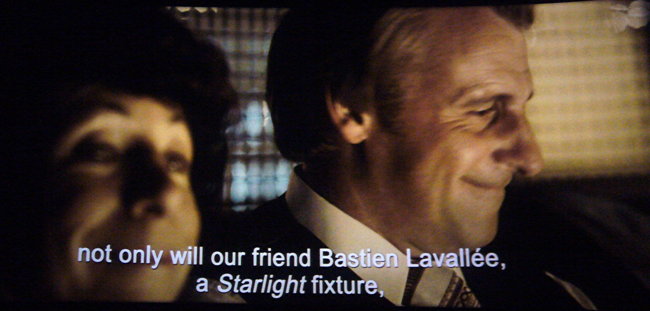Funkytown is the long-awaited cinematic voyage through the recent history of Montreal disco. You can easily determine the density of heterosexualism of male critics by the degree to which they either hated it or picked nits, especially about the dramatic elements that are actually necessary to make the story work.
I attended a superexclusive public “screening” with a mere six others and enjoyed it rather a lot. Douglás “Coco” Léopold’s unique admixture of English and French was not well evoked, but that’s because nobody has talked like him before or since. His dialect died with him.
In a post–Mad Men mediascape, everyone is attuned to this bilingual picture’s period accuracy.
-
Chargex card? ✔
-
Contempra phones? ✔
-
Smoked-glass tumblers? ✔
But the tail end of Volkswagen Vanagon was visible in one shot, as was a 21st-century water fountain. And many of the film’s disco hits were cover versions, though usually very convincing ones.
How ’bout the type?
Poorly done, as it turns out. Memo to Daniel Roby and Steve Galluccio: Vulgar Helvetica knockoff Arial did not exist in 1978, and under no circumstances would it have appeared on the side of the marquee of (Le) Starlight. (I’d send the same memo to the production designer if I could figure out who that was – Jean Bécotte?)
Next, shall we discuss failed subtitling? First of all, it too is in Arial, with neutral quotation marks, not enough lead, invariant bottom-centre positioning, and random italicizations. As we know already, grotesk typefaces do not work for subtitling, Arial least of all.
Much worse was the affliction that has beset Montreal for decades: The delusion that francophones can speak English just smashingly, but no anglophone can really speak French. (Try speaking English-accented French to any store clerk and see how far you get.) Francophones believe that mastery of their gloriously complex tongue – as Richler put it, “the language of Molière (also of Allô Police)” – makes the debased gobbledygook that is English a piece of cake.
Not so fast. As ever, Francophones cannot hear inflected word endings and have no idea at all how to write nonverbal utterances.
Plus various straight-up typos (“I love to Love,” “One hour' wait in line” – hour', not hour’).
Roxanne Deslongchamps is listed as subtitle supervisor for the English version. I’m just going to go out on a limb here and speculate she isn’t a native speaker of English. That would make her unqualified for the job if true.
DVD and television versions of Funkytown will face a vexing problem, one that was completely muffed on Bon Cop, Bad Cop.
-
No fucking Arial anywhere.
-
We need a version that subtitles English into French, another version that subtitles French into English, and a captioned version that simply renders all utterances. (No all-bottom-centre fake captions.) Unless you’re willing to fiddle with CC1 vs. CC3, none of this can be done using Line 21 on DVD; it all has to happen with subpictures. (Again: No fucking Arial anywhere.)
-
For TV, it gets even trickier, because you need versions with open English and French subtitles and closed Line 21 French and English captions, respectively. Then we need French-dominant and English-dominant audio-described versions.
This is much too complicated for the Quebec “subtitling” industry to handle; it cannot even distinguish subtitling from captioning because their very language makes it impossible. Technicolor, Deschamps’ listed employer, will certainly be in over its head in this regard. Captions, Inc. in L.A. can do it, but Remstar and Maple won’t want to put up the money – a few measly thousand. Besides, captioning and subtitling the glorious Québécois tongue in the United States would be an even graver insult than sending it out of the country to Canada.
Galluccio is somewhat tired of Quebec separatists’ complaints about the language mixture in his picture. Even if one accepts the language mix as a problem (I don’t), it’s too late to be fixed. It isn’t too late to fix these problems. I want Funkytown’s languages written down, translated, and typeset correctly. All it takes is willingness, a slightly larger budget, and a tamping down of one’s anger that I dared to point any of this out.
Gerald Hannon complained thus on the TFEW mailing list, under the subject heading “The importance of punctuation”:
From the contents page of the online Toronto Life (April issue)[:]
*One Hundred and Eighteen Days
* Of the many humiliations James Loney suffered during his terrifying
captivity in Baghdad, the worst was his kidnappers’ promise---delivered
and broken, over and over---that he was about to be set free By Gerald
Hannon
This isn’t a question of punctuation but of markup. The original is marked up thus:
<p><strong>One Hundred and Eighteen Days</strong><br />
Of the many humiliations James Loney suffered during his terrifying captivity in Baghdad, the worst was his kidnappers’ promise—delivered and broken, over and over—that he was about to be set free By Gerald Hannon</p>
It’s supposed to look like this:
<h2>One Hundred and Eighteen Days</h2>
<p>Of the many humiliations James Loney suffered during his terrifying captivity in Baghdad, the worst was his kidnappers’ promise – delivered and broken, over and over – that he was about to be set free</p>
<p class="byline">By Gerald Hannon</p>
These are the incompetent fucks who just bought Torontoist. (Then again, everyone who responded to Hannon’s message top-posted, sometimes several plies deep. These are the people creating your content.)
As ever with Toronto Life, reality never intrudes on the magazine’s coverage, aimed as it is at the dumb rich. That pattern extends even to the technical sphere: A magazine that can’t even mark up a table-of contents page (and whose very slugs are half-assed) claims Toronto is ruled by “app kings.”
Natalia Ilyin (q.v.):
On March 2, the faculty of Rhode Island School of Design overwhelmingly voted no confidence in Maeda’s ability to lead the school as president…. [T]he faculty is not “uncomfortable,” “disappointed” and “generally unsatisfied” with John Maeda. They hate him. They have lost all respect for him as a leader and as a person. And they want him out….
John Maeda may think that because he has a smartphone and can process the video he is taking of you (while you are trying to converse with him) through HTML5 and make it interact with objects in a cornfield in real time or some such thing, that somehow his vision of what art education is and should be is “more advanced” than that of the rest of the faculty at RISD, but in this thinking he is also mistaken….
[W]e did not understand that his great talent seems to be that of the person who first sees a shiny object in the marketplace and runs to get it…. We wanted bright, shiny things to be part of what people saw at RISD.
-
Does anyone understand what Seth Godin is doing?
-
First book is Godin’s own, not that he’s up front about that
-
Unsolicited submissions are, as with vieille formulation publishing, pissing in the wind. Plus he can steal your ideas
-
Functionally a vanity press for anyone with the historical misfortune of failing to be Seth Godin
-
A simply boggling piece of writing, “Making Friends,” which you have to look at via Instapaper these days because the writer for some unknown reason killed his darling now restored.
I was sitting about five feet from Frank Chimero on Friday and… I failed to ask him the one question I wanted to: Why is there a fancy cover, special editions, macaroni art, etc., instead of a written book? […]
One need only look at the struggles of Merlin Mann’s nebulous Inbox Zero to wonder if a great blogger can finish a book. Frank can take a shit in a pretty cover and ship it, and you all just funded it. Frank just pocketed 67 grand [nope: 112] because he’s Internet Famous.
Many people call that a community, but I call it a collaboration of fools. Where are the fire-starters? Why are we reading directionless ships like Cognition? Does Andy Clarke really come up with compelling speeches 175 times a year? […] Zeldman used to fight for standards, now he posts gym pics on Twitter….
Why did you guys buy a book that doesn’t even have a chapter outline? […] Where’s the design book that says stop doing this, please?
What qualities do we seek in leadership these days? […] That they did something 7 years ago that was really great? That they speak at the same conferences? What qualities do we find great in these people? Where do we go to find new, interesting producers? Inquiring minds want to know.
I for one reject the author’s retrospective self-flagellation.
Something else that’s wrong with publishing
Academics and a small press want to put out a mere three books a year, stretching from 2009 all the way to 2015, on a topic that should be banged out by the dozens in E-book form: Queer films that intellectuals approve of. It’s a 1990s concept to begin with, and the shortlist is almost a joke. It’s as if they’re specifically excluding Parting Glances (which ideally would be covered in a twin volume with its intertextual successor, Billy’s).

